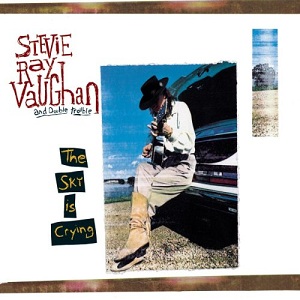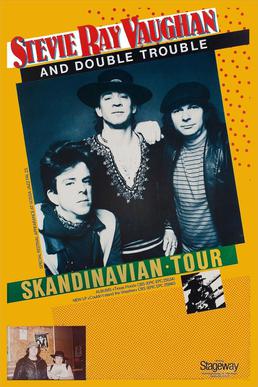
Eric Johnson is an American guitarist, vocalist and composer. His 1990 album Ah Via Musicom was certified platinum by the RIAA, and the single "Cliffs of Dover" won the Grammy Award for Best Rock Instrumental Performance.

Stephen Ray Vaughan was an American musician, best known as the guitarist and frontman of the blues rock trio Stevie Ray Vaughan and Double Trouble. Although his mainstream career spanned only seven years, he is regarded as one of the most influential musicians in the history of blues music, and one of the greatest guitarists of all time. He was the younger brother of guitarist Jimmie Vaughan.
The 27th Annual Grammy Awards were held on February 26, 1985, at Shrine Auditorium, Los Angeles, and were broadcast live in the United States by CBS. They recognized accomplishments by musicians from the year 1984.

Texas Flood is the debut studio album by the American blues rock band Stevie Ray Vaughan and Double Trouble, released on June 13, 1983, by Epic Records. The album was named after a cover featured on the album, "Texas Flood", which was first recorded by blues singer Larry Davis in 1958. Produced by the band and recording engineer Richard Mullen, Texas Flood was recorded in the space of three days at Jackson Browne's personal recording studio in Los Angeles. Vaughan wrote six of the album's ten tracks.

In Step is the fourth studio album by Stevie Ray Vaughan and Double Trouble released in 1989. The title In Step can be seen as referring to Vaughan's new-found sobriety, following the years of drug and alcohol use that eventually led Vaughan into rehabilitation. It was also Vaughan's final album with Double Trouble and the last album to be released during his lifetime. In 1990, he recorded an album with his brother, Jimmie Vaughan, called Family Style; later that same year, Stevie Ray Vaughan died in a helicopter crash.

"Superstition" is a song by American singer-songwriter Stevie Wonder. It was released on October 24, 1972, as the lead single from his fifteenth studio album, Talking Book (1972), by Tamla. The lyrics describe popular superstitions and their negative effects.

"Voodoo Child (Slight Return)" is a song recorded by the Jimi Hendrix Experience in 1968 that appears as the final track on the Electric Ladyland album released that year. It contains improvised guitar and a vocal from Jimi Hendrix, backed by Noel Redding on bass and Mitch Mitchell on drums. The song is one of Hendrix's best known; it was a feature of his concert performances throughout his career, and several live renditions were recorded and released on later albums.

Double Trouble is an American blues rock band from Austin, Texas, which served as the backing band for singer-guitarist Stevie Ray Vaughan. The group was active throughout the 1980s and contributed to reviving blues music, inspiring many later blues and rock acts. Formed in Austin, Texas in 1978, the group went through several early line-up changes before settling on a power trio consisting of Vaughan, Chris Layton (drums), Tommy Shannon (bass). They became a four-piece by 1985 after adding Reese Wynans (keyboards). Whilst with Vaughan they were billed Stevie Ray Vaughan and Double Trouble. Rooted in blues and rock music, the group worked in various genres ranging from ballads to soul, often incorporating jazz and other musical elements.

The Sky Is Crying is the fifth and final studio album by Stevie Ray Vaughan and Double Trouble, compiling songs recorded throughout most of their career. Released 14 months after Vaughan's death in 1990, the album features ten previously unreleased tracks recorded between 1984 and 1989. Only one title, "Empty Arms", appeared on any of the group's previous albums. The tracks were compiled by Vaughan's brother, Jimmie Vaughan, and was Vaughan's highest charting album at number 10.

Live at Carnegie Hall is the third live album by American blues rock band Stevie Ray Vaughan and Double Trouble, released by Epic Records in July 1997. The album consists of live selections from their sold-out October 4, 1984, benefit concert at Carnegie Hall for the T.J. Martell Foundation. Backed by a ten-piece big band for the second half of the event, Vaughan had celebrated his thirtieth birthday the night before, and called the concert his "best birthday ever, forever". The band's double-set performance, which included several blues and R&B standards, was highly successful, receiving mostly positive reviews from music critics.

Characters is the twenty-first studio album by American singer-songwriter Stevie Wonder, released in late 1987. The album features six singles including the Grammy-nominated "Skeletons" (#19) and "You Will Know" (#77), which both reached number one on the Billboard R&B Singles chart. The album also contained a duet with Michael Jackson, "Get It" (#80), that was a minor hit.

"Hide Away" or "Hideaway" is a blues guitar instrumental that has become "a standard for countless blues and rock musicians performing today". First recorded in 1960 by Freddie King, the song became a hit on the record charts. It has been interpreted and recorded by numerous blues and other musicians and has been recognized by the Rock and Roll Hall of Fame and the Grammy Hall of Fame.

The Texas Flood World Tour was a concert tour in North America and Western Europe, undertaken by American blues rock band Stevie Ray Vaughan and Double Trouble in 1983 and 1984. The band had released their debut album, Texas Flood, a week before the tour began.

The Couldn't Stand the Weather Tour was a worldwide concert tour by blues rock band Stevie Ray Vaughan and Double Trouble. Produced in support of their 1984 album Couldn't Stand the Weather, the tour visited North America, Europe, Australasia and Japan from 1984 to 1985. To reflect the new musical direction that the group took with Couldn't Stand the Weather, the tour was aimed to differ from their past and surpass expectations of the band. In comparison to Vaughan and Double Trouble's modest stage setup from the previous Texas Flood Tour, the Couldn't Stand the Weather Tour involved a slightly more elaborate production. It utilized grander amplifier setups and sound systems to take advantage of the larger venues in which they performed. To avoid their renowned strictly blues material, Vaughan and Double Trouble embodied a more expanded and varied repertoire during performances. In disparity to the previous tour, each of the Couldn't Stand the Weather shows opened with mostly the same three songs before other material was played. The album and the tour were the beginnings of the group's mid-eighties musical development.
The Soul to Soul Tour was a concert tour through North America, Europe and Australasia, undertaken by American blues rock band Stevie Ray Vaughan and Double Trouble from 1985 through 1986. At the beginning of the tour, the band had finished recording their album Soul to Soul. Their commercial and critical acclaim had been demonstrated during the Couldn't Stand the Weather Tour in 1984, when they had played before a sold-out audience at Carnegie Hall. Longing for opportunities to expand the group's lineup, Vaughan and Double Trouble hired keyboardist Reese Wynans during the Soul to Soul recording sessions in Dallas, Texas. Throughout the tour, the band's success was confirmed as their performances consistently amazed and gratified their audiences.

The Live Alive Tour was a concert tour through North America and Europe, undertaken by Stevie Ray Vaughan and Double Trouble from 1986 to 1988. At the start of the tour, Vaughan and bassist Tommy Shannon had both achieved sobriety. Their success with overcoming long-term drug and alcohol addiction had been attained by entering a rehabilitation facility, where they stayed for four weeks. Although Vaughan was nervous about performing while sober, he received encouragement from his bandmates. Throughout the tour during performances, Vaughan would warn his audiences about the dangers of substance abuse.

The In Step Tour was a concert tour through the United States and Canada, undertaken by American blues rock band Stevie Ray Vaughan and Double Trouble from 1989 to 1990. Launched in support of their fourth and final studio album In Step, this was the third tour to include keyboardist Reese Wynans, who joined the band in 1985. Stevie Ray Vaughan and Double Trouble achieved international fame when their debut album, Texas Flood, was released in June 1983. Throughout their subsequent concert tours, the group's success was confirmed as their performances consistently amazed and gratified their audiences. Similar to their previous tours, the In Step Tour was a minimalist production. The stage featured a simple light show that changed according to the mood of certain songs performed. Although Vaughan and Double Trouble never followed a set list, all ten songs from In Step were played at least once during the tour, and as many as seven of them were included in each of the band's performances.

Stevie Ray Vaughan was an American blues rock guitarist, singer, and songwriter, and the frontman for the band Double Trouble. He is often regarded as one of the greatest guitarists and blues musicians of all time. During his career, he released four studio albums, one live album, and several singles.

Live at Montreux 1982 & 1985 is the fourth live album of American blues musician Stevie Ray Vaughan and his band Double Trouble, recorded at the Montreux Jazz Festival on July 17, 1982 and July 15, 1985, and released November 20, 2001 on Epic Records. Neither are complete concerts.















